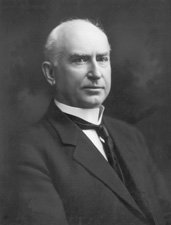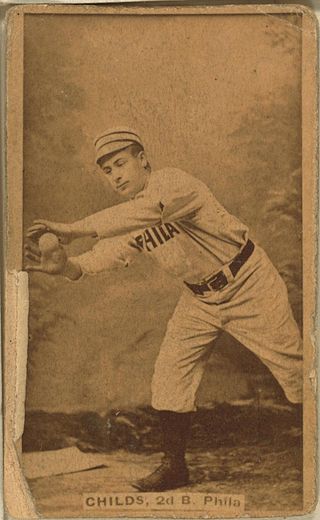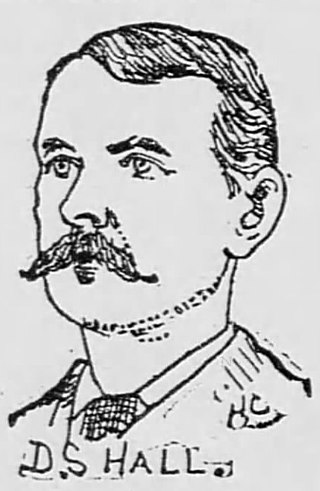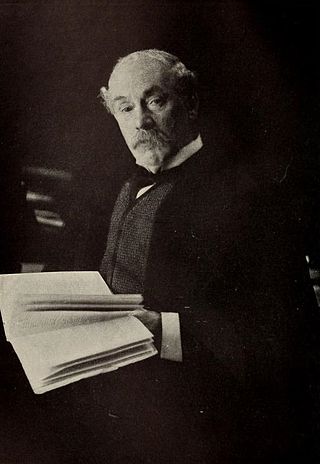
James Paul Clarke was a lawyer and politician from the Arkansas Delta during the Progressive Era. He served in public office over a period of almost 30 years, rising from the Arkansas General Assembly to Attorney General of Arkansas and later 18th Governor of Arkansas, ending his career in the United States Senate. In a period of Democratic Party hegemony known as the "Solid South", Clarke blended positions of the budding Populist movement, such as free silver and railroad regulation, with white supremacy and his gifted skills as an orator to popularity and electoral success.

Fred Clifford Clarke was an American Major League Baseball player from 1894 to 1915 and manager from 1897 to 1915. A Hall of Famer, Clarke played for and managed both the Louisville Colonels and Pittsburgh Pirates. He was a left fielder and left-handed batter.

The Louisville Colonels were a Major League Baseball team that also played in the American Association (AA) throughout that league's ten-year existence from 1882 until 1891. They were known as the Louisville Eclipse from 1882 to 1884, and as the Louisville Colonels from 1885 to 1891; the latter name derived from the historic title of the Kentucky Colonel. After the AA folded in 1891, the Colonels joined the National League and played through the 1899 season.

The Sewanee Review is an American literary magazine established in 1892. It is the oldest continuously published quarterly in the United States. It publishes original fiction and poetry, essays, reviews, and literary criticism.

Clarence Lemuel "Cupid" Childs was an American second baseman in Major League Baseball with a 13-season career from 1888, 1890–1901, playing for the Philadelphia Quakers, Cleveland Spiders, St. Louis Perfectos and Chicago Orphans of the National League and the Syracuse Stars of the American Association.

Janet Clarke Hall (JCH) is a residential college of the University of Melbourne in Australia. The college is associated with the Anglican Province of Victoria. JCH is one of the smallest of the colleges of the university and was the first university college in Australia to admit women.

Enoch Louis Lowe was the 29th Governor of Maryland in the United States from 1851 to 1854.

Darwin Scott Hall was an American Republican politician who served one term in the United States House of Representatives, representing Minnesota's 3rd congressional district. He also served in the Minnesota Legislature.

Philo Hall was a South Dakota attorney and politician. He served as Attorney General of South Dakota and a member of the United States House of Representatives.

The Ordnance BL 15-pounder, otherwise known as the 15-pounder 7 cwt, was the British Army's field gun in the Second Boer War and some remained in limited use in minor theatres of World War I. It fired a shell of 3-inch diameter with a maximum weight of 15 pounds (6.8 kg), hence its name which differentiated it from its predecessor '12-pounder' 3-inch gun which fired shells weighing only 12.5 pounds (5.7 kg).
Stephen or Steve(n) Clark(e) may refer to:

Sir Caspar Purdon Clarke was an English architect and museum director.
Whitehall is a location in Clarke County, Georgia entirely within the city limits of Athens, Georgia.

William John Turner Clarke, M.L.C., was an Australian politician, member of the Victorian Legislative Council November 1856 to January 1861 and January 1863 to November 1870.

St Hugh's Church or St Hugh of Lincoln Church is a Roman Catholic Parish church in Lincoln, England. It was built from 1892 to 1893. It is situated on the corner of Monks Road and Friars Lane in the city centre. It was designed by Albert Vicars and is a Grade II listed building.

Plaesiomys is a genus of extinct lamp shells belonging to the family Plaesiomyidae.
Orthoidea is a superfamily of brachiopods containing the families:
The Hastings Giants was the final nickname of the minor league baseball teams, based in Hastings, Nebraska between 1887 and 1959. The Hastings Giants played in the short-season Class D level Nebraska State League from 1956 to 1959. Earlier Hastings teams played as members the Western League (1887), Nebraska State League and Tri-State League (1924).
Minor league baseball teams were based in Hastings, Nebraska in various seasons between 1887 and 1959, playing under numerous nicknames. The Hastings Giants played in the short-season Class D level Nebraska State League from 1956 to 1959. Earlier Hastings teams had played as members the Nebraska State League in 1892, Western League in 1887, the Nebraska State League from 1910 to 1915 and 1922 to 1923 and the Tri-State League in 1924. The Hastings Giants were a minor league affiliate of the New York Giants from 1956 to 1957 and San Francisco Giants in 1958 and 1959 while hosting home minor league games at Duncan Field.














